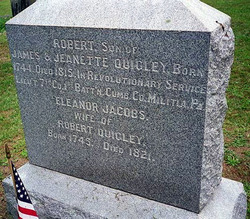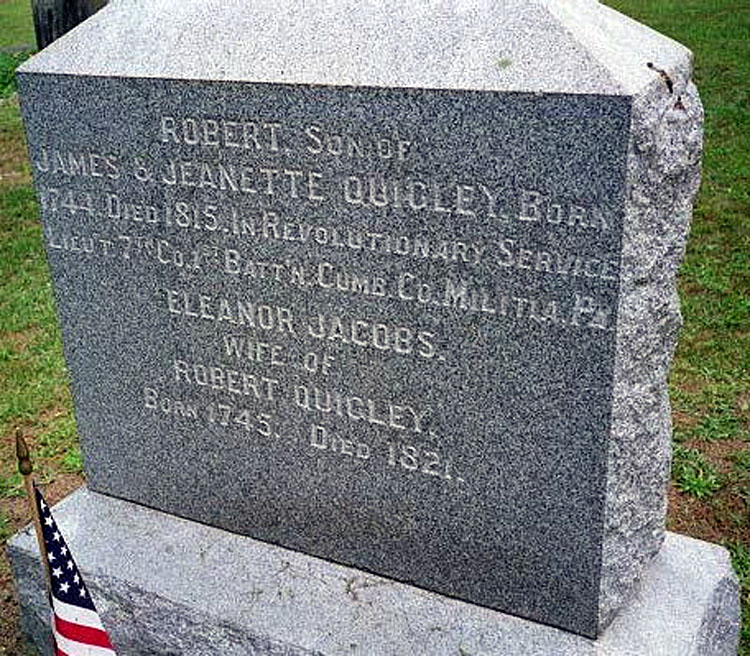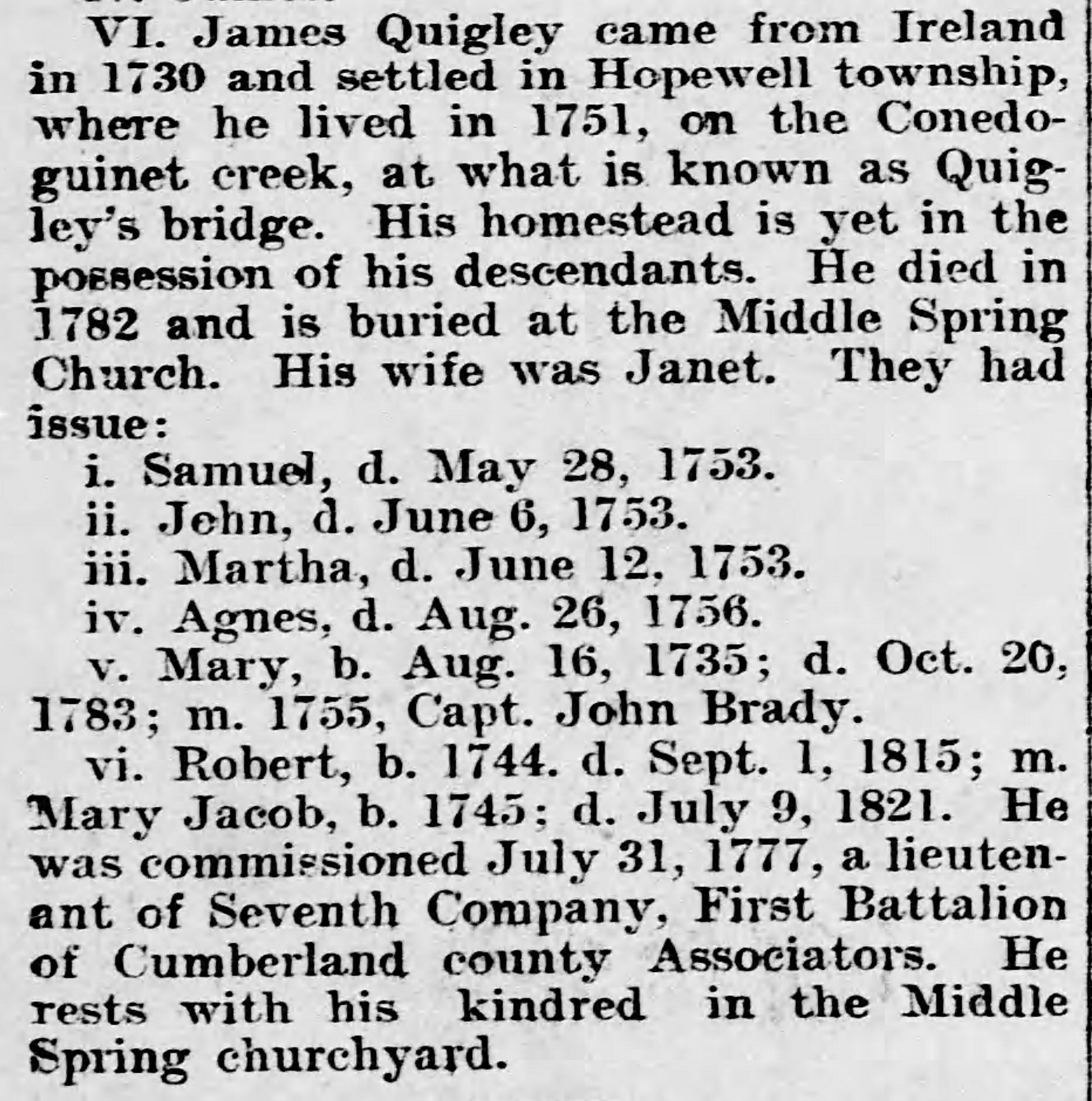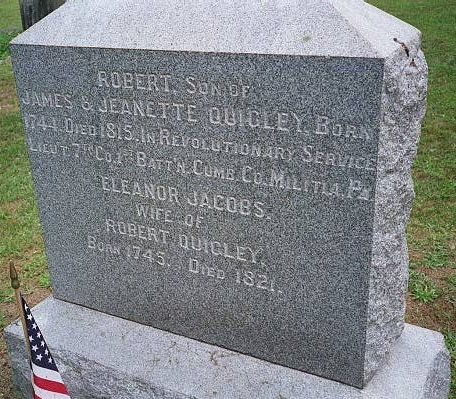Robert, son of James Quigley and Jeanette Quigley, was born 1744, in Hopewell township, Cumberland Co., Penna., near Quigley's Bridge, along the Conodoguinet Creek, died September 1, 1815; married Mary Jacob, born 1745, died July 9, 1821, whose ancestors lived in Wales. Their descendants were Quakers. Her father came to America with the Penns.
He took his wife to his father's home, and father and son worked together to make the fertile fields a source of income, as well as a garden of loveliness. From infancy the son was the companion of his father. Born fourteen years after his parents settled on this wild tract of land, he early learned to wield the axe, fell the forest trees, and follow his father with the plow. In the summertime he harvested the grain, ranked the wood in stacks for winter use, cleared the land of brush and stubble, and built fences, bridges, and laid out roads. Through the short winter days he studied, and with the few books at his command, gained a knowledge of history and Bible truths, committing large portions of scripture. His boyhood days were days of peril, and the dark skin of the savage gleamed from every hiding place. Year after year he heard of blood-thirsty advances in the valley, hundreds falling beneath the blow of the tomahawk, and learned with infant lips to raise the cry of danger, and with the eye of infancy to pick the trail of the savage. Almost as soon as he could shoulder a musket, he was taught its use, as well as its necessity, and struggled with the Indian problem, and fought the dusky braves from childhood until they were under subjection to the white man.
His brother John, who was some years his senior died in 1753, leaving Robert the sole protector of his mother during the absence of his father when serving his country in the Colonial War, after his appointment as ensign in 1756.
The valley was teeming with life and activity. For twenty-five years the Scotch Irish had settled within its bounds and with the true hearted thrift and industry of a thousand families, the waste places were filled, and the fields planted with grain. The barren was made fruitful, and the uncultivated tract was changed into a region of beauty. At intervals, the Indians who were driven from their native haunts, returned to their old hunting grounds and fishing streams, with intent to kill, and blood stains along the paths and mountains passes were indicative of the fulfillment of their desires. Not far from the Quigley home was a fort, where the women and children gathered, when the rumor of an attack drove the men to a neighboring hill which commanded a view of the valley for miles around. Friends were slaughtered and houses made desolate, yet the Quigley family and homestead were spared. The log house which sheltered parents and children for so many years was unharmed. Although along the Conodoguinet Creek, where the Indians pushed their canoes and fished, they were only the friendly braves who ventured on shore, and offered terms of peace to the family. Yet always on the alert, Robert Quigley put his hand on his musket many times a day, and never left it unloaded, lest he be surprised. The art of cunning was so well learned by the savage, that the white man was ever on guard.
Robert Quigley was born with the love of country deeply implanted within his bosom, and was commissioned July 31, 1777, lieutenant of the Seventh Company, First Battalion, Cumberland County Militia. His encounters with the Indians and practice in the shooting of game made him a skilled marksman, and during the Revolutionary War many a redcoat fell beneath his unfaltering aim and steady nerve. He fought for freedom, and helped to sever his land and the countrymen from the galling yoke which bound them.
He and his wife were members and regular attendants of the Middle Spring Presbyterian church, which his parents were instrumental in organizing. Many members who were compelled to ford the creek, were irregular in their attendance, the stream at times being impassable, but not having the inconvenience of crossing the creek, he and his family were rarely absent from worship.
They sat under the preaching of the Rev. John Blair who succeeded Rev. Thomas Craighead, Rev. Robert Cooper from 1765 to 1805, and Rev. John Moody D. D. who began his pastorate in 1805 and continued in charge of the congregation for fifty years. Their neighbors and friends attended the same church, and the Sabbath was a day of pleasant reunion as well as a season of worship. In the early days of the settlement, a peaceful frame of mind was not enjoyed by the worshiper, for the fear of an Indian outbreak was the prevailing thought in each heart, but gradually their outrages subsided, and muskets were no longer stacked at the church door, nor did the anxious eyes of the family as they returned to the home scan the horizon for a flame or a curl of smoke, that might be the last of what was once their fireside, built by their hands.
Robert Quigley was a strong character, upright and honorable in business transactions, on whose judgment the settlers depended, realizing that they could rely on his candor and wise decisions. He was a man of few words, but they were justly and agreeably uttered. Not harsh of speech, his kindly manner drew all men unto him, and his gentleness made him a favorite with children. Refined and courteous, he considered the welfare of others his chief pleasure. He laid for his children the foundations of sterling, influential characters, and aided by his wife, he possessed a home in which glowed the most devoted affection, and to which friends and neighbors came with the greatest delight. Their children were all born in the old homestead. "Gentle of speech but absolute of rule" they taught their sons and daughters to respect and obey their wishes in all things.
Robert Quigley died six years before his wife.
His will is dated November 8, 1814 and probated September 23, 1815, three weeks after his death. It reads as follows:
"Joseph and John shall pay from their shares, funeral expenses of self and wife. My wife Mary shall have one feather bed, one bedstead, and clothing for bed, curtains and warming pan, one chest of drawers, one small trunk she had when married, table and chairs sufficient for use, cupboard and furniture, and whole of kitchen furniture, two milch cows, one horse and saddle, said articles to be at her disposal. She shall have one room in the east end of the house, with a chimney made in said room, to have privilege of the kitchen and part of the cellar for her real use, to have access to go and come in any part of the mansion farmhouse, and to be kept in sufficient firewood. Joseph and John to support their mother during life. If wife should leave house or room, Joseph and John are to pay her yearly twenty-five pounds, she having right to take movable property with her. To son James 350 pounds, to four daughters Eleanor, Jennet, Dinah and Mary 600 pounds equally divided between them. The balance of estate to Joseph and John." The balance of the estate was valuable, and the farm land yielded a lucrative income. The property consisted of more than the usual number of outbuildings, a log house of one and a half-stories in height, which was one of the first dwellings erected in the valley, and 400 acres of land. The original house was replaced by a brick house in 1842 and has descended from father to son, and is still in the possession of the family. It did not stand on the exact site of the present building, where the road from Newville to Newburg branches into a road to Shippensburg and Middle Spring, but nearer the creek. Near the mansion house was a clover mill which stood on the bank of the Conodoguinet Creek until 1860, when it was torn down and not rebuilt. It was erected by Robert Quigley, and at his death constituted part of his estate. To this mill neighbors brought their grain, and it became quite a business center.
For years the fording near the mill was the best place to cross the creek. About the year 1826 or 1828 a covered bridge was made to span the stream, which is still known as Quigley's Bridge. Two miles north west, lies Newburg, which was incorporated at an early date. In 1810, John, son of Rev. Robert Cooper D. D., organized and established a school at that place, known as Hopewell Academy. The public road from Newville ran in front of the Quigley home, over the bridge, on to Newburg, and the students coming and going, and the continuous travel every day, made the life of the family less monotonous than many of the settlers who lived in more isolated districts. The Cumberland Valley Railroad runs seven miles distant, and the mail is still carried over the route to Newburg from Newville. Though the old bridge stands, strange eyes look from the house near by for the carrier, for inherited and owned by descendants of Robert Quigley, it is occupied by tenants.
Among the early generations of the family, blue eyes, brown hair, and strong vigorous constitutions predominated. A mixture of red hair and brown eyes was noticeable in, some of the children of Robert Quigley, and is seen in descendants until the present day. He was large, powerfully built, while his sister Mary Quigley Brady was small, active, and full of vivacity. Brother and sister were devoted to each other. Although nine years older than Robert, she was his companion in childhood as well as his counselor. Between them sprang a deep affection, which did not decrease with years and distance to separate them. With less height than is accorded to the majority of women, but an indomitable will, she braved dangers and difficulties unknown to the feminine heart of later days. Her brother had a warm, affectionate spirit, and with his wife and children, was an ideal husband and father, who contributed largely to their comfort and provided bountifully for their temporal needs. Not wealthy, they had ample provision for all necessities, stock and fine horses, with their acres of land in good condition, their home furnished with the conveniences of primitive times.
Within a radius of fifty miles were one hundred families of Scotch Irish birth and blood, who were congenial, and gave to society an element of refinement and culture. The visits of friends were not numerous until after the Revolutionary War. When peace was declared and the Indians subdued, neighbors became more sociable and exchanged pleasant intercourse. Hospitality was more generally extended and social functions brought kindred and acquaintances in closer contact, which warm attachment continues to this day amongst the members of the Quigley House.
In Revolutionary Service Lieut. 7th Co. 1st Bat'n Cumb. Co. Militia PA.
Please note: some suggest his middle name was Brady, but there is absolutely no evidence of that.
Robert, son of James Quigley and Jeanette Quigley, was born 1744, in Hopewell township, Cumberland Co., Penna., near Quigley's Bridge, along the Conodoguinet Creek, died September 1, 1815; married Mary Jacob, born 1745, died July 9, 1821, whose ancestors lived in Wales. Their descendants were Quakers. Her father came to America with the Penns.
He took his wife to his father's home, and father and son worked together to make the fertile fields a source of income, as well as a garden of loveliness. From infancy the son was the companion of his father. Born fourteen years after his parents settled on this wild tract of land, he early learned to wield the axe, fell the forest trees, and follow his father with the plow. In the summertime he harvested the grain, ranked the wood in stacks for winter use, cleared the land of brush and stubble, and built fences, bridges, and laid out roads. Through the short winter days he studied, and with the few books at his command, gained a knowledge of history and Bible truths, committing large portions of scripture. His boyhood days were days of peril, and the dark skin of the savage gleamed from every hiding place. Year after year he heard of blood-thirsty advances in the valley, hundreds falling beneath the blow of the tomahawk, and learned with infant lips to raise the cry of danger, and with the eye of infancy to pick the trail of the savage. Almost as soon as he could shoulder a musket, he was taught its use, as well as its necessity, and struggled with the Indian problem, and fought the dusky braves from childhood until they were under subjection to the white man.
His brother John, who was some years his senior died in 1753, leaving Robert the sole protector of his mother during the absence of his father when serving his country in the Colonial War, after his appointment as ensign in 1756.
The valley was teeming with life and activity. For twenty-five years the Scotch Irish had settled within its bounds and with the true hearted thrift and industry of a thousand families, the waste places were filled, and the fields planted with grain. The barren was made fruitful, and the uncultivated tract was changed into a region of beauty. At intervals, the Indians who were driven from their native haunts, returned to their old hunting grounds and fishing streams, with intent to kill, and blood stains along the paths and mountains passes were indicative of the fulfillment of their desires. Not far from the Quigley home was a fort, where the women and children gathered, when the rumor of an attack drove the men to a neighboring hill which commanded a view of the valley for miles around. Friends were slaughtered and houses made desolate, yet the Quigley family and homestead were spared. The log house which sheltered parents and children for so many years was unharmed. Although along the Conodoguinet Creek, where the Indians pushed their canoes and fished, they were only the friendly braves who ventured on shore, and offered terms of peace to the family. Yet always on the alert, Robert Quigley put his hand on his musket many times a day, and never left it unloaded, lest he be surprised. The art of cunning was so well learned by the savage, that the white man was ever on guard.
Robert Quigley was born with the love of country deeply implanted within his bosom, and was commissioned July 31, 1777, lieutenant of the Seventh Company, First Battalion, Cumberland County Militia. His encounters with the Indians and practice in the shooting of game made him a skilled marksman, and during the Revolutionary War many a redcoat fell beneath his unfaltering aim and steady nerve. He fought for freedom, and helped to sever his land and the countrymen from the galling yoke which bound them.
He and his wife were members and regular attendants of the Middle Spring Presbyterian church, which his parents were instrumental in organizing. Many members who were compelled to ford the creek, were irregular in their attendance, the stream at times being impassable, but not having the inconvenience of crossing the creek, he and his family were rarely absent from worship.
They sat under the preaching of the Rev. John Blair who succeeded Rev. Thomas Craighead, Rev. Robert Cooper from 1765 to 1805, and Rev. John Moody D. D. who began his pastorate in 1805 and continued in charge of the congregation for fifty years. Their neighbors and friends attended the same church, and the Sabbath was a day of pleasant reunion as well as a season of worship. In the early days of the settlement, a peaceful frame of mind was not enjoyed by the worshiper, for the fear of an Indian outbreak was the prevailing thought in each heart, but gradually their outrages subsided, and muskets were no longer stacked at the church door, nor did the anxious eyes of the family as they returned to the home scan the horizon for a flame or a curl of smoke, that might be the last of what was once their fireside, built by their hands.
Robert Quigley was a strong character, upright and honorable in business transactions, on whose judgment the settlers depended, realizing that they could rely on his candor and wise decisions. He was a man of few words, but they were justly and agreeably uttered. Not harsh of speech, his kindly manner drew all men unto him, and his gentleness made him a favorite with children. Refined and courteous, he considered the welfare of others his chief pleasure. He laid for his children the foundations of sterling, influential characters, and aided by his wife, he possessed a home in which glowed the most devoted affection, and to which friends and neighbors came with the greatest delight. Their children were all born in the old homestead. "Gentle of speech but absolute of rule" they taught their sons and daughters to respect and obey their wishes in all things.
Robert Quigley died six years before his wife.
His will is dated November 8, 1814 and probated September 23, 1815, three weeks after his death. It reads as follows:
"Joseph and John shall pay from their shares, funeral expenses of self and wife. My wife Mary shall have one feather bed, one bedstead, and clothing for bed, curtains and warming pan, one chest of drawers, one small trunk she had when married, table and chairs sufficient for use, cupboard and furniture, and whole of kitchen furniture, two milch cows, one horse and saddle, said articles to be at her disposal. She shall have one room in the east end of the house, with a chimney made in said room, to have privilege of the kitchen and part of the cellar for her real use, to have access to go and come in any part of the mansion farmhouse, and to be kept in sufficient firewood. Joseph and John to support their mother during life. If wife should leave house or room, Joseph and John are to pay her yearly twenty-five pounds, she having right to take movable property with her. To son James 350 pounds, to four daughters Eleanor, Jennet, Dinah and Mary 600 pounds equally divided between them. The balance of estate to Joseph and John." The balance of the estate was valuable, and the farm land yielded a lucrative income. The property consisted of more than the usual number of outbuildings, a log house of one and a half-stories in height, which was one of the first dwellings erected in the valley, and 400 acres of land. The original house was replaced by a brick house in 1842 and has descended from father to son, and is still in the possession of the family. It did not stand on the exact site of the present building, where the road from Newville to Newburg branches into a road to Shippensburg and Middle Spring, but nearer the creek. Near the mansion house was a clover mill which stood on the bank of the Conodoguinet Creek until 1860, when it was torn down and not rebuilt. It was erected by Robert Quigley, and at his death constituted part of his estate. To this mill neighbors brought their grain, and it became quite a business center.
For years the fording near the mill was the best place to cross the creek. About the year 1826 or 1828 a covered bridge was made to span the stream, which is still known as Quigley's Bridge. Two miles north west, lies Newburg, which was incorporated at an early date. In 1810, John, son of Rev. Robert Cooper D. D., organized and established a school at that place, known as Hopewell Academy. The public road from Newville ran in front of the Quigley home, over the bridge, on to Newburg, and the students coming and going, and the continuous travel every day, made the life of the family less monotonous than many of the settlers who lived in more isolated districts. The Cumberland Valley Railroad runs seven miles distant, and the mail is still carried over the route to Newburg from Newville. Though the old bridge stands, strange eyes look from the house near by for the carrier, for inherited and owned by descendants of Robert Quigley, it is occupied by tenants.
Among the early generations of the family, blue eyes, brown hair, and strong vigorous constitutions predominated. A mixture of red hair and brown eyes was noticeable in, some of the children of Robert Quigley, and is seen in descendants until the present day. He was large, powerfully built, while his sister Mary Quigley Brady was small, active, and full of vivacity. Brother and sister were devoted to each other. Although nine years older than Robert, she was his companion in childhood as well as his counselor. Between them sprang a deep affection, which did not decrease with years and distance to separate them. With less height than is accorded to the majority of women, but an indomitable will, she braved dangers and difficulties unknown to the feminine heart of later days. Her brother had a warm, affectionate spirit, and with his wife and children, was an ideal husband and father, who contributed largely to their comfort and provided bountifully for their temporal needs. Not wealthy, they had ample provision for all necessities, stock and fine horses, with their acres of land in good condition, their home furnished with the conveniences of primitive times.
Within a radius of fifty miles were one hundred families of Scotch Irish birth and blood, who were congenial, and gave to society an element of refinement and culture. The visits of friends were not numerous until after the Revolutionary War. When peace was declared and the Indians subdued, neighbors became more sociable and exchanged pleasant intercourse. Hospitality was more generally extended and social functions brought kindred and acquaintances in closer contact, which warm attachment continues to this day amongst the members of the Quigley House.
In Revolutionary Service Lieut. 7th Co. 1st Bat'n Cumb. Co. Militia PA.
Please note: some suggest his middle name was Brady, but there is absolutely no evidence of that.














